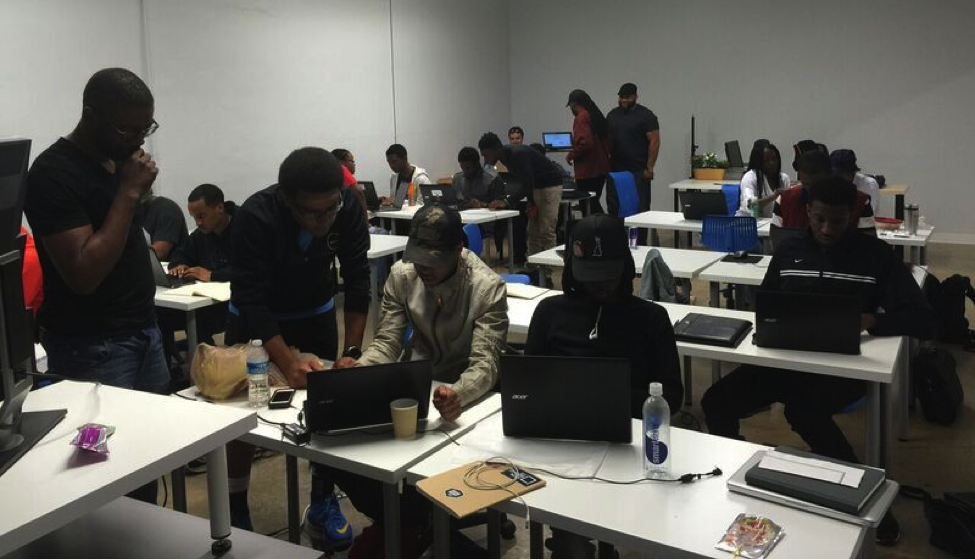Back

Blog
Opportunity Hub’s #CodeStart Students Learning More than Tech

Written by Amanda Maher
When the Obama Administration launched its $100 million TechHire initiative last year, it brought a renewed focus on the opportunities in one of America’s fastest growing fields: information technology. Yet the TechHire initiative also sheds light on how difficult these jobs have been for minorities to access. According to one report, African-Americans and Latinos comprise just 4 percent and 5 percent, respectively, of 11 of the largest tech companies in the U.S.
As ICIC’s recent report Creating Inclusive High-Tech Incubators and Accelerators: Strategies to Increase Participation Rates of Women and Minority Entrepreneurs discussed, minority entrepreneurs are significantly underrepresented in high-tech incubators and accelerators. However, the report highlights several incubators and accelerators that have successfully increased their inclusion rates. One such featured organization was Atlanta’s Opportunity Hub.
From access to capital to mentorship, there were few opportunities to help Rodney Sampson succeed as a young, African-American tech entrepreneur. This reality prompted Sampson to found Opportunity Hub, profiled in a recent What Works Case Study, in 2013. The Atlanta-based entrepreneurship center offers entrepreneurs a pre-accelerator program, business incubator, networking events, mentorship opportunities and access to an ecosystem of investors and capital providers. In just three years, 100 companies have gone through the pre-accelerator program alone.
Opportunity Hub also partnered with TechSquare Labs, the City of Atlanta’s Workforce Development Agency and The Iron Yard to give shape to #CodeStart, a 13-month coding, entrepreneurship, career readiness and financial literacy program. Through #CodeStart, disconnected youth and under-employed young adults from Atlanta’s inner city will participate in a rigorous, full-time coding program that will lead to placements as entry-level computer programmers, developers and engineers. The program also offers an entrepreneurship component for students who might be interested in launching new tech companies.
Students receive housing and a monthly living stipend while enrolled in the program, the first of its kind in the nation and one of the first supported through the TechHire initiative. The first cohort kicked off at the end of last month and included 17 students.
Only two full days into training, an incident highlighted the need for a multi-faceted program like #CodeStart.
In a series of 37 tweets, Sampson recounted the experience of involving one of his #CodeStart students: “Today, our #CodeStart students received their monthly living stipends. Many went to deposit them during lunch break. We encouraged all of them to go to their banks. Most of the students have bank accounts. A few don’t,” he explained. One of the male students went to a check cashing outlet where he presented a USPS money order. Suspicious of fraud, the store manager called the police, who arrested the student.
Fortunately, just prior to his arrest, the student was able to call the #CodeStart director, who was able to get in touch with Sampson. The police required Sampson to provide proof of purchase and a receipt for the specific USPS money order in question before they would release the student.
“Here he is, doing the right thing, trying to learn Java which isn’t easy to learn; but he is still being impacted by predatory racism,” wrote Sampson. Nearly 150,000 people have viewed these tweets as aggregated on Storify. “I felt this young man’s pain. It reminded me of the times that I had been profiled in high school, college, medical school, MBA [and at a] startup.”
From this, Sampson realized that inner city youth must learn the hard skills (like coding), but they also need financial education and soft skills such as conflict resolution.
Since the incident, all #CodeStart students now have bank accounts. Through a partnership with Operation Hope, all students will learn how to build credit, save money, invest strategically and create wealth. Moreover, all students will receive an assessment and therapy from the Georgia Community Clinic.
If the first week of #CodeStart is indicative of the thirteen months still to come, students will have a long road ahead of them. But as Creating Inclusive High-Tech Incubators and Accelerators shows, Sampson and others are helping to leverage the tech industry’s opportunities to help create well-paying jobs for inner city residents.
